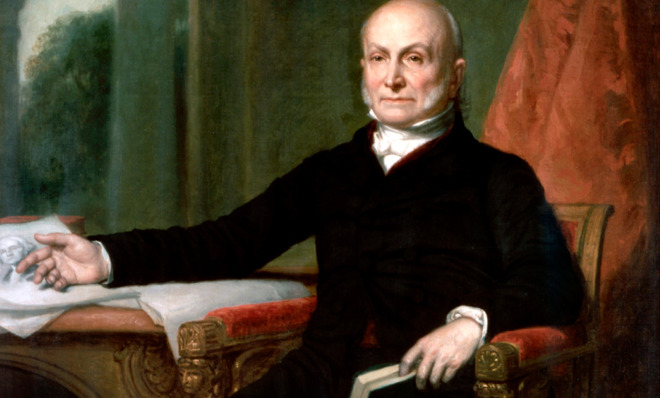John Quincy Adams: America's best mediocre president
His time in the White House was largely ineffective. But Adams had the greatest post-presidency of any chief executive.


A free daily email with the biggest news stories of the day – and the best features from TheWeek.com
You are now subscribed
Your newsletter sign-up was successful
John Quincy Adams wasn't exactly itching to be president. Along with George Washington, Adams was perhaps the only man elected to the presidency who so thoroughly doubted his worthiness for office, and who so fastidiously avoided the appearance of interest in it.
He wrote in 1823 that the presidency "is not in my opinion an office to be either solicited or declined.... The principle of the Constitution in its purity is that the duty shall be assigned to the most able and the most worthy." In his diary, he would repeat the sentiment: "If I am to be a candidate, it must be by the wishes... of others, not by mine."
In the next presidential contest, the most controversial in the early republic, the electors did just that.
The Week
Escape your echo chamber. Get the facts behind the news, plus analysis from multiple perspectives.

Sign up for The Week's Free Newsletters
From our morning news briefing to a weekly Good News Newsletter, get the best of The Week delivered directly to your inbox.
From our morning news briefing to a weekly Good News Newsletter, get the best of The Week delivered directly to your inbox.
But with "the corrupt bargain" hanging over his administration from his inauguration onward, John Quincy Adams' presidency became the least accomplished thing about him. As president, he dearly desired to put America on the world stage, but his ambitions for a national university, a national observatory, and federal funding for the arts were thwarted by his political enemies.
Adams suffered the distinction of being only the second U.S. president to lose re-election. The first was his father. Worse still, his loss to Andrew Jackson amounted to a special kind of insult. Compared to the temperate, reserved, and supremely literate Adams, Jackson was an ambulatory backwoods ditch-fire of illiterate rage.
But it would be wrong of us, on Presidents Day, to let the smallness of Adams' White House legacy obscure the largeness of the man. John Quincy Adams was one of the greatest statesman in the republic's history. He served his government with both George Washington and Abraham Lincoln. He also had the greatest post-presidency of any chief executive.
At the age of 17, Adams was made the United States minister to the Netherlands. He would become the nation's first received minister in Russia's court, serving with distinction until he was recalled to negotiate the Treaty of Ghent, which ended America's second war with Great Britain. Later, as secretary of state, he helped conceive and author the Monroe Doctrine, one of the most durable foreign policy dictums in the nation's history.
A free daily email with the biggest news stories of the day – and the best features from TheWeek.com
After his presidency, Adams returned to elected office in the House. He abhorred Jackson's cruel expulsion of Native Americans, and worked for their welfare from the Congressional Committee on Indian Affairs.
Many film buffs will remember his role as a lawyer, helping to guarantee freedom for the slaves on the ship Amistad. But Adams' opposition to the notorious "gag rule" was probably one of the finest and most important political campaigns in history.
In the early 1830s, northern abolitionists increasingly made their moral claims known to Congress through petitions. Adams was the congressman most clearly identified with the effort, as he presented most of these himself. By the middle of the decade, pro-slavery forces passed a number of measures that "tabled" any petition having to do with slavery before it could be read. This was the gag rule that prevented genuine debate on slavery. Adams attacked it with great moral force.
He occasioned a near-riot within the chamber in 1837 by presenting petitions from 22 slaves. The gag rule was finally suspended in 1844, and Adams' tireless efforts helped define the terms of the coming debate. While never declaring himself an outright abolitionist, his fight against the gag rule revealed that "the Slave Power" would subvert free speech – and, potentially any American right – to defend this inhuman institution.
He never hewed to a party, but by being the finest specimen of 19th-century Yankee conservatism, he became one of the age's leading liberals. His legacy is now too large for any ideological faction or party.
Adams' death was met with a mourning that fully recognized his great role in the life of the American Republic. On Presidents Day, perhaps we ought to mourn the loss of America's best mediocre president again.
Michael Brendan Dougherty is senior correspondent at TheWeek.com. He is the founder and editor of The Slurve, a newsletter about baseball. His work has appeared in The New York Times Magazine, ESPN Magazine, Slate and The American Conservative.
